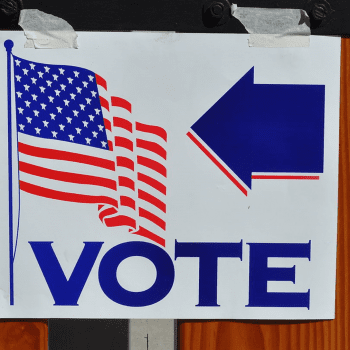
Ah, the train wreck that is Illinois politics.
Here’s a piece of local news that’s old by now, but still important to share: the Illinois Supreme Court, in a decision on August 25, decreed that the Independent Maps Amendment, a proposed amendment to the Illinois constitution that was to have been placed on the November ballot after a lengthy petition drive and 500,000 signatures, failed to pass muster constitutionally. The proposed amendment would have provided for a nonpartisan process for drawing state legislative districts, to replace a system in which the party in power gerrymanders its way into continued power — but, not surprisingly it was challenged by a group calling itself The People’s Map, claiming to be concerned about ethnic minority representation but known to be sponsored by Michael Madigan and his political allies.
The Court justified its decision on the basis that the amendment exceeded the scope permitted under the constitution:
But in writing for the Supreme Court majority on Thursday, Justice Thomas Kilbride said that while redistricting is an issue that could meet the constitutional test of affecting both the “structure and procedure” of the legislature as required of a citizen-driven amendment, the plan offered by the Independent Maps groups went beyond the scope of dealing only with changing the legislative branch of the constitution.
Specifically, the court’s majority cited a provision that would have had the auditor general review applicants for a panel that would ultimately determine the commissioners assigned to draw new legislative maps.
“As presently constituted, (the legislative article of the constitution) does not mention the ‘subject’ of the auditor general’s office or its duties, even in passing,” Kilbride wrote. “Moreover, the additional duties the ballot initiative imposes on the auditor general creates changes that (do not affect) the actual structure or makeup of the legislature itself.”
No one’s buying this.
Here’s what the Tribune had to say in an editorial the next day:
It was a straight party-line vote, Democrats over Republicans. Make of that what you will. Nobody gets elected to the Illinois Supreme Court without partisan money and muscle. And there is no issue more partisan than redistricting.
That’s why the legal assault on the amendment — and on a similar measure two years ago — was led by attorney Michael Kasper, proxy for Illinois House Speaker Michael Madigan. . . .
The amendment falls squarely within the intent of Article XIV, Section 3 of the Illinois Constitution. The framers of the document left it mostly to lawmakers to propose amendments, but they granted voters limited authority to initiate changes that apply to legislative matters. Delegates to the 1970 convention knew lawmakers wouldn’t act to check their own powers.
In nearly half a century, only one voter-driven amendment has made it to the ballot. (Voters approved it.) Citizen initiatives keep trying — collecting hundreds of thousands of signatures, raising and spending millions of dollars — and courts keep swatting them away. Why? Because lawyers have imagined all sorts of hidden prohibitions in the language of the article, and judges have been eager to accept them. . . .
You can squint at the actual wording all day and never see the part that says voters can’t propose an amendment that assigns the auditor general a role in the redistricting process. It’s not there.
In a further editorial on Friday, the Trib wrote:
In Illinois, Supreme Court justices run in partisan elections for 10-year terms and have the ability to raise enormous sums of campaign cash. According to The Council of State Governments, Kilbride in his 2010 retention campaign raised $2.8 million, largely from Democratic interests — more than the total amount raised by “all candidates in all other judicial retention elections nationally between 2000 and 2009.” . . .
[T]he reformers will have to play hardball. No more badminton. If they want to beat the machine, they have to pay closer attention — we all do — to Supreme Court races.
As a reminder, the role of the house speaker is outsized in terms of the Illinois legislative process, but, to an even greater degree, Mike Madigan is as powerful as he is because of the purse strings he controls; he controls his fellow Democrats, and keeps getting elected to that position, because he controls their campaign funds. And Illinois is trapped in dysfunction because Madigan, and pretty much everyone else, are more concerned with advancing and enriching themselves than serving the people of Illinois.
What’s all the more irritating is this: the Illinois constitution requires that, every 20 years ago, a referendum be placed on the ballot asking if there should be a constitutional convention. The last such vote was in 2008, and the “no” vote won by a 2/3 – 1/3 margin, as voters were told that the existing constitution was perfectly fine, there was an amendment process if necessary, and a convention would be a waste of money.
Hard to believe that was only 8 years ago — and yet we’re now learning that a convention may be the only way to escape the current misgovernment and failures, if the Supreme Court repeatedly determines that amendments such as the Independent Maps proposal, which was the result of much legal scrutiny, are no good. Let’s not forget, too, that desperately needed pension reform can likewise go nowhere due to Supreme Court roadblocks and Constitutional language placed their by a prior generation of feckless legislators.
When I first moved to Illinois, I would say this: “I’m used to governmental corruption — after all, I grew up in a suburb of Detroit — but I never imagined it would stretch beyond city government to the state level.” I guess I should now rephrase this to “I never imaged it would extend all the way to the State Supreme Court.”
And 2028 is a loooong way away.
image: train wreck, from pixabay.com; public domain.













